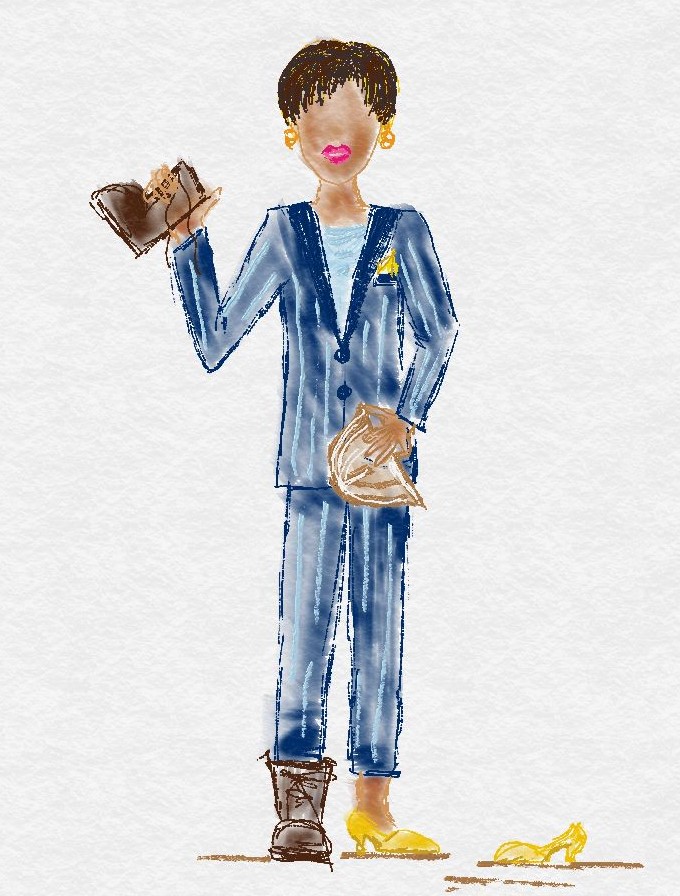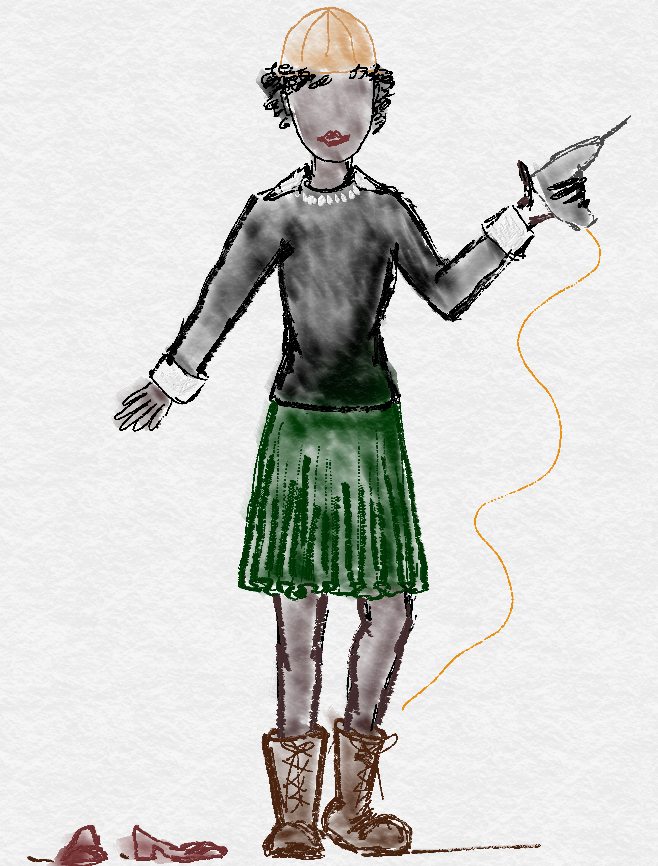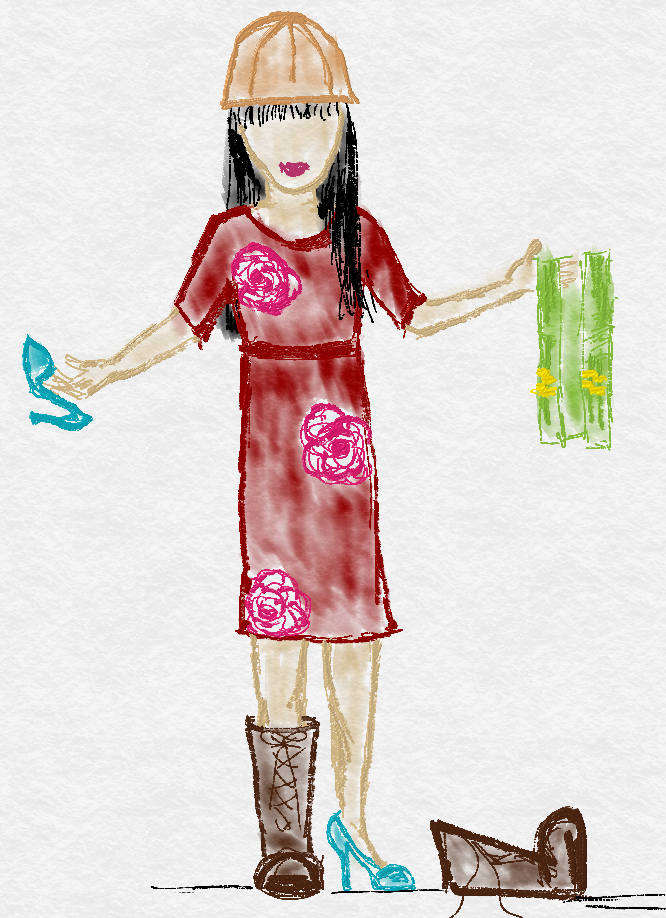metoo
Civil Wars
The Casualties Are Higher When It’s Personal

It didn’t take the #metoo movement for most of us to be familiar with being undervalued or disrespected or ignored at work or in school. Even our youngest millennials who work in progressive companies with open-minded colleagues have run into ugliness at some point. The trouble may have come from a backwards guy on a jobsite spouting obscene suggestions while he ignored your engineering evaluation of the problem with his soil nail wall. You may have lost a promotion to a guy with less experience but who the boss felt more comfortable sending out to construction sites. Or the issue may have been more subtle; a manager who professed to care about your career but who kept assigning difficult projects to others in order to “give you less stress.”
As we wade through these swine-infested waters, the implication is that all of our problems are work issues. The offenders are people from families that aren’t yours. The misogynists are other women’s husbands (bless their hearts). And when you leave the offensive situation at work, you get to go home to sympathetic people who love you and value you for everything wonderful that you are.
Yes, in the candy-canes-and-teddy-bears world in my head this is true. We all have supportive, understanding partners and close-knit, warm families. Diane Keaton will be playing your mom in the movie about how you took on the unequal power structure at your company and won, and Kelly Clarkson will do the soundtrack.
How often is this really true? Using the analytical side of our personalities, does it make statistical sense that all of us fabulous women in our field would have enlightened partners and families? Not a chance. We have to be realistic about the fact that our career choices likely will make waves for us personally as well as professionally. And it’s doubtful that there’s an HR office in your house to sort it out. So solving your inequality problems with people you are tied to legally and genetically probably will be much more complicated than taking care of your work issues. And much more painful.
I worked with a woman years ago whose father was an earthwork contractor. He had raised his two sons to work in the family business, and neither had ended up working with him. On the other hand, his daughter had spent her childhood begging to learn how to operate a backhoe, asking questions about grade stakes and stockpiles. He told her that girls had no place in construction. She tried for years, only to be rebuffed. Finally out of high school, she chose to go to engineering school, hoping for a “backdoor” into her father’s world. Sadly, he never accepted her. His disapproval and lack of pride in his daughter’s accomplishments led to bitterness and anger in her. When I met her she was in her late twenties, and her bitterness toward her father subconsciously controlled most of her actions. She slept with men of whom she knew he would disapprove; she slanted all of her evaluations on jobsites against the interests of the contractors; and she measured every career victory in terms of what her father was missing. It was tragic.
Could she have changed her father’s longstanding opinions if she had tried a different approach? Could she have proven to him through actions that his outdated beliefs were wrong? We’ll never know. They stopped speaking to each other years ago.
Many counselors and psychologists will tell you that insecurities are magnified a thousand fold with your “family of origin.” This sensitivity can make rectifying a bad situation seem insurmountable. The emotions involved can cloud reason and douse any flame of energy for being patient with ingrained prejudices and longstanding beliefs. With family, a woman must have a true desire to change her relatives’ beliefs and behaviors. And she must have patience above all. Because she is not just redefining another person’s beliefs, she is restructuring the family unit. Making progress may not always be possible, and it will be arduous when it does occur.
A relationship with a partner is a completely different issue. A partner is someone who has been chosen. The implication is that the chosen person loves you and wants what’s best for you, no matter what. Even if such a person would have outdated beliefs, they would be easy to convert to a more progressive mindset because they think you’re fabulous.
If only it were that simple. As Annie Schmelzer said so brilliantly in this post, most guys don’t go around with a T-shirt that says they’re insecure sexists who will try to undermine you the minute they feel threatened. Wait – threatened? If you love a man and he loves you, why should he ever feel threatened? If you really love each other (and you didn’t get together just because all of your other friends were getting married and it was “time”), you both want nothing more than the health and happiness of the other person. Anything less isn’t real love. But close-but-no-cigar love often comes disguised as real love. Unfortunately, the voids usually don’t appear until it’s too complicated to just walk away.
My mistakes in this area have been spectacular, the product of my leap-before-I-look personality and my perpetual optimism. (Really? That alcoholic who flirts with me every time I come out on site doesn’t respect me? But he said he likes me…) My longtime boyfriend in college was very supportive of my engineering career until I ran into a problem with a guy on my second co-op job in school. When I told my boyfriend that I had brought it up to my boss, he said, “Hey – I didn’t sign up for any feminist crusade.” A guy had just been extremely disrespectful to me, and all my boyfriend could think about was not being involved in a conflict. And I was too stupid to get out of the relationship at the time.
Even though I broke up with that guy later, my obliviousness continued. Probably the most painful experience I had was when I got married to a man who professed to think that my job was “cool” and that he was proud of me. I had always thought that the best part of marriage was sharing yourself with another person, not being afraid that the other person will judge you or use what you share against you. Both of you are supposed to always be on the other’s side. But what I found is that every time I did well at work, my husband would use something I had told him against me. If I solved a dispute on a construction site, he would remind me that I had stomach ulcers and was “weak.” If I gained a new client, he would work into conversation that I get my rights and my lefts mixed up often. If someone else complimented me on my work at a party, he would tell the crowd that I told him how nervous I was when I had to deal with a particular client. I didn’t recognize the pattern – or the motive – at first, but as time went on his comments became meaner and his acknowledgements of anything I did well fewer and far between. Needless to say, he loved some idea of me, but not the actual me. Not the me who wades through mud in deep sinkholes. Not the me who changes her own tires and doesn’t automatically ask a man to perform tough jobs. And being with someone who didn’t want me to be the best person I could, whether as a muddy engineer or in a more traditional role, wasn’t healthy.
As difficult as our professional problems with gender inequality may be, solving the same problems in our personal lives is far more complicated and burdensome. The emotions involved can distort our perceptions of what is best for us and distract us from the truth in our lives. There is no handbook, no company policy, no legal recourse for being narrow-minded in a personal relationship. But we have our sisterhood in this, too, and we owe it to other women to support them when they need us, whether the problem is personal or professional. People we love and who allege to love us should love us for who we are, not who they want us to be. And just like in our professional lives, we owe it to ourselves not to settle for less.
Time’s Up II
Part II – Us

Previously we addressed the unsuitable behavior of some men in the workplace, and we offered guidelines for those men who were either sincerely or disingenuously unable to tell the difference between appropriate and inappropriate actions. The other variable in the equation that adds up to a happy workplace is our behavior. Yes, us, the women who are the subjects of this stramash. We may be the victims, but that does not mean we don’t have certain responsibilities in moving toward a solution to the problem.
Wait, what? Somehow the wrong attitudes and actions of other people create responsibilities for us? But we didn’t do anything. Why should we have to work to take care of a problem caused by someone else?
We have a responsibility here because this isn’t Candyland. This is real life, and we live in a world that has been evolving for about 4.54 billion years, give or take 10 to 50 million years. Every ice age, every extinction, every social change, every shift in hemlines has been a product of interdependent factors in a complex environment. You can sit on your princess throne and say that men should just change and life should just be fair. Good luck with that.
For our part, it will only help our cause if we are proactive and do everything in our power to stop the bad guys and enlighten the good guys. Sure, you could just sit around and be mad, waiting for social change to sweep across professional society like a special effect in a science fiction movie. Your desired results will take much, much longer that way, and you will be disconnected from the end result. Instead, we can all take some basic steps to help create an environment that is fair and beneficial to all of us.
1. Repeat after me, “Not all men are bad.” (Okay, you get a pass on this if some guy just broke up with you on a Post-It and you’re out drinking with your girlfriends). It’s funny, because even most guys I know will say, “Men are pigs.” The implication is that men are led around by their baser instincts and, therefore, will always be low quality humans who make bad decisions. But that’s just not true. Even from a statistical standpoint, it is highly unlikely that 49% of 7 billion people would ALL have sub-par character. And assuming that all men are bad is a negative attitude that will ill prepare you for helping your co-workers and bosses and clients evolve into more enlightened colleagues. Saying that all men are bad is a defeatist attitude that will not move us forward even an inch (or a centimeter for our Canadian and European readers).
2. We have to be aware of our own behavior and how it affects the perception of the men around us. I will admit that I sometimes have difficulties with this. I am a toucher – if you’ve met me, I’ve probably hugged you. I routinely grasp the nearest person’s arm to make a point, and I’ll squeeze a colleague around the shoulders to offer congratulations. I have learned that this sometimes generates confusion with my male colleagues. Yes, I’m proud of you for getting that journal article published, but no, I don’t intend to sleep with you as an attaboy. Unfortunately, many men will admit that they are less than adept at reading subtle signs and differentiating between behavior types in various situations. Simply put, some guys think you must want to sleep with them because you squeezed their arms. They are not pigs, they’re just…clueless. It has taken me awhile, but I have learned that I need to be more restrained in many situations to avoid confusion. It doesn’t mean I have to be cold and unfriendly, I just have to pay more attention to men’s reactions and err on the safe side until I feel like I know someone well. This doesn’t mean I’m being unduly burdened, it just means I’m being a responsible adult.
It goes without saying that flirting on the job will broadcast the idea that you might be receptive to inappropriate actions. Certainly, no means no. But you can avoid the pothole more easily if you don’t steer the car in that direction.
3. We have to speak up every time. Sometimes we endure an ugly situation and we emerge unscathed. The temptation is to let well enough alone and move on. Say your boss got physical with you, you gave him what-for, and now he’s acting respectful and giving you a wide berth. You consider just chalking it up to a bad memory and never speaking of it again. But what about the next woman? Maybe she’s not as brave as you are. Maybe she has four kids at home and she’s petrified she’ll lose her job. So the boss just moves on to harassing her. When she finally gets up the nerve to blow the whistle, the supporting evidence you have that would have helped her establish a pattern of behavior isn’t there. Management doubts her claim, because they usually do at first, and when you finally come forward, HR says, “If this really happened, why didn’t you complain?” When you say that the issue was solved, people inevitably look at the other woman and say, “Why didn’t you just do what she did?” Everyone becomes distracted from the fact that what the guy has been doing is WRONG. We need to address bad behavior every time.
It should be noted that at some point in time your justifiable whistle blowing most likely will result in an accusation that you’re just a whiner. You’re too sensitive. You caused the problem. Or, my favorite, you’re just hard to work with. Almost every woman in our field over the age of 30 has been told this at some point because she made public some guy’s bad behavior. I wish I could say don’t worry about it, it won’t happen. But it will, so you have to tell yourself in advance that you’re doing the right thing, and you’re a delightful person. No one can make you feel bad about yourself if you don’t let them.
4. We must always use our power for good. On the opposite side of justifiable whistle blowing is using sexual harassment as a tool to get back at a man with whom you have a personal dispute. Just like sexual harassment, false accusations are wrong. Ruining a man’s reputation because you don’t like him is wrong. Claiming sexual wrongdoing when a workplace romance goes horribly awry is wrong.
I once worked with a woman who actively pursued one of the engineers with the company, even seducing him at his desk after hours. When the short-lived affair went south, she got angry with the engineer and went to the boss to say that she was offended that Playboy magazines were kept in the men’s restroom by this engineer. She felt sexually harassed by this. Obviously, her campaign was personal, and I didn’t back her up when the boss asked me if I also felt compromised. She was furious with me, but I told her that her claim would make it difficult the next time a real problem happened.
This list is not comprehensive, because the best defense is a great offense. But probably our biggest responsibility in our very complicated campaign to rid the workplace of sexual inequalities is our need to support our sisters. This does not mean you have to agree with every opinion of every woman you know, and we don’t all have to be friends. But when another woman needs support, whether it be help reporting a problem or a sympathetic ear to try to figure out how to deal with a difficult boss, you owe it to YOURSELF to give her whatever she needs. The military doesn’t teach the infantry to stick together just to promote good social skills. Don’t ever leave anyone behind and you won’t get left behind.
Time’s Up
Part I – Them

The recent Harvey Weinstein revelations, #metoo movement, and Time’s Up campaign have had a number of consequences, most of them quite fabulous. Let’s start by saying that I have ZERO problem with the fact that a bunch of actresses finally brought attention to a problem a lot of us have faced for years. Some women I know have complained that women in “fluffy” jobs are celebrating victory when women all over the world have been suffering with this scourge for millennia. Seriously? Do we care who caused the tide to turn? I don’t. If little green female leprechauns happen to be the ones to breach the dam of harassment because they complained about the male leprechauns grabbing their lucky charms, I don’t care. Kudos to Ashley Judd and Reese Witherspoon and the others for speaking for all of us. I’d thank them in person with a vat of chocolate chip cookies if I could.
Not surprisingly, the scandals have led to a lot of men claiming to not understand the rules. Some of these guys are sincere and concerned that they have been doing things inadvertently that might make women uncomfortable. Some of the men are irritated that they don’t get to do whatever they want and complain that the new rules are “just too hard to figure out.” As usual, they try to put the shadow of blame on us by characterizing our complaints as vague and arbitrary. They attempt to cast us as insensitive by insinuating that we’re no longer receptive to “nice” gestures. Other guys feign ignorance and innocence and claim the nuances are just too difficult for the average guy to comprehend. And still others are just hateful sexists who don’t care whether they make us uncomfortable and use the controversy to fuel their misogyny.
My favorite comments are from guys who very obviously understand what is suitable and what isn’t but claim that “There are just too many gray areas.” Really? I think in most cases the gray areas are products of willful confusion. For every guy who truly is trying to understand where the boundaries in his professional relationships should be, there are two guys who profess not to know whether or not they should be putting their hands on the thighs of young female employees. “What? That’s a problem? I can’t believe you’re faulting me for showing a gesture of comfort to my young, inexperienced subordinate.” Right.
For these poor, well-meaning, caring individuals, I offer the following test. Cut it out and hand it out as necessary when this question arises. When a guy is really confused about whether or not to do/say something to one of his female colleagues or employees, tell him to ask himself the following questions:
1. Would you tell your wife about it?
2. Would it be okay if another guy did/said it to your daughter?
3. Would you publish it in your church bulletin or company newsletter?
If the answer to any of these questions is No, then DON’T DO IT. If you’re not sure, then DON’T DO IT. See how easy that was?
If a guy starts to come up with clarification questions or comments (i.e. “Do you mean would I describe it in detail?” “Does it matter how old my daughter is?”), you know he doesn’t really want to know the true answer. Those are the guys who aren’t really asking to understand – they’re asking to try to prove why their historic pattern of behavior was okay.
On the other hand, there are a lot of very nice, caring guys out there who actually are concerned and well-meaning when they put a hand on your shoulder to ask if you’re okay. They tell you that you look fabulous today because it always puts a smile on your face. And they help you with your coat and give you a hand to get up from your chair because they weren’t raised by wolves. We have to appreciate the good intentions and manners lest we drive them away forever.
Actually, communication is a tool that men easily could use in these situations, but they don’t. If a man is not sure if it bothers his young female protégée when he takes her hand to help her out of the car, he can ask her. Direct communication is a revolutionary concept, but is rarely used, particularly by people in the engineering profession. (We’re not known for our social prowess). We women have to be receptive to such questions and answer honestly. If it looks like your boss is trying to be a good guy, help him out.
The concept that actually is difficult to grasp for men in supervisory positions is that a subordinate woman might feel she has to comply with whatever her boss does or she’ll lose her job. This feeling may not be evident to the boss…at all. But a 22-year-old brand new female employee is still a novice in the world, and her perception of the power structure at work might lead her to believe that her job would be in jeopardy if she expressed how she felt about her interactions with her boss. As such, the boss should ALWAYS err on the side of caution. Is it really necessary to pat a young engineer on the back when he tells her she did a good job? Must he tell the young project manager that she looks great in that outfit? It’s not essential to the job and the supervisor doesn’t know the employee well, the answer is no. If it’s going to create all of this mental angst and confusion (for both the supervisor and the employee), why do it?
As a caveat, it should be stated that there are many, many male and female professionals who have longstanding friendships with members of the opposite sex, (contrary to what you learned in When Harry Met Sally). Theoretically, if you have a good friend who is not your superior or subordinate, the lines of communication are open, and a guy can ask a woman, “Can I put my hand there or does that offend you?” If she can’t give him an honest answer, they aren’t really friends.
The problem of sexual harassment is not simple, and no one set of rules can answer every conceivable question. But the cat is out of the bag, the worms are out of the can, the grout has busted out of the pipe. We need to have a real dialogue with those great, quality guys we work with every day, to help them understand how to move from unsuitable cultural customs to behaviors that benefit all of us. For the rest of the guys, the ones who “just don’t understand,” we’ll make flash cards.


